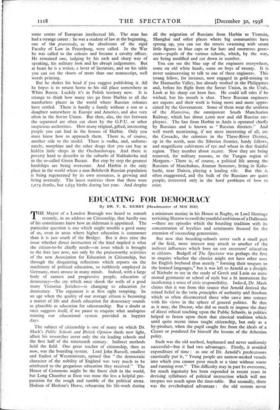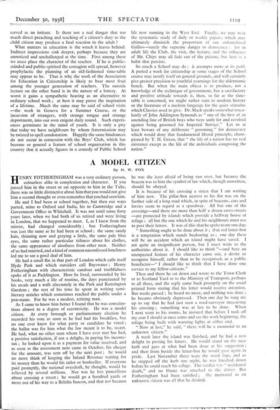EDUCATING FOR DEMOCRACY
By DR. T. K. DERRY [Headmaster of Mill Hill)
THE Mayor of a London Borough was heard to remark recently, in an address on Citizenship, that hardly one of his constituents knew how an alderman is appointed. The particular question is one which might trouble a good many of us, even in areas where higher education is commoner than it is just south of the Bridges. But it does raise the issue whether direct instruction of the kind implied is what the citizen-to-be chiefly needs—an issue which is brought to the fore just now, not only by the praiseworthy activities of the new Association for Education in Citizenship, but through the disquieting reflections which reports on the machinery of political education, so ruthlessly employed in Germany, must arouse in many minds. Indeed, with a large body of earnest and progressive people, education of democracy—the cry which once shook the walls of a good many Victorian Jerichos—is changing to education for democracy. The argument is at first sight tempting. In an age when the quality of our average citizen is becoming a matter of life and death education for democracy sounds as plausible as education for salesmanship. But a doubt at once suggests itself, if we pause to enquire what analogous training our educational system provided in happier days.
The subject of citizenship is one of many on which Dr. Mack's Public Schools and British Opinion sheds new light, albeit his researches cover only the six leading schools and the first half of the nineteenth century. Indirect methods held the field. One great teacher of citizenship, then as now, was the boarding system. Lord John Russell, smallest and frailest of Westminsters, opined that "the democratic character of the nobility of England was very much to be attributed to the gregarious education they received." The House of Commons might be the finest club in the world, but Long Chamber at Eton was none the less a helpful pre- paration for the rough and tumble of the political arena. Hodson of Hodson's Horse, rehearsing his life-work during a miniature mutiny in his House at Rugby, or Lord Hastings revisiting Harrow to swell the youthful ambitions of a Dalhousie —these are episodes which the boarding tradition with its concentration of loyalties and sentiments focused for the attention of succeeding generations.
But now that boarding-schools cover such a small part of the field, more interest may attach to another of the indirect influences which bore on our ancestors' education as citizens. Budgell of The Spectator was perhaps the first to enquire whether the classics might not have other uses for English boyhood than merely," forming their tongues to the learned languages," but it was left to Arnold as a disciple of Niebuhr to see in the study of Greek and Latin no mere mental gymnastic or school of style but a fit instrument for inculcating a sense of civic responsibility. Indeed, Dr. Mack claims that it was from this source that Arnold derived the mixed belief in the twin principles of authority and freedom which so often disconcerted those who came into contact with his views in the sphere of general politics. Be that as it may, the Doctor, who did so much to impose the duty of direct ethical teaching upon the Public Schools, in politics helped to fasten upon them that classical tradition which until quite recent times taught citizenship, but, only as a by-product, when the pupil caught fire from the ideals of a Cicero or pondered for himself the lessons of the Athenian polity.
Such was the old method, haphazard and never uniformly successful—but it had two advantages. Firstly, it avoided expenditure of time : as one of Dr. Arnold's predecessors caustically put it, "Young people are narrow-necked vessels into which you cannot pour much at a time without waste and running over." This difficulty may in part be overcome, for much ingenuity has been expended in recent years in devising syllabuses of political instruction which will not trespass too much upon the time-table. But secondly, there was the psychological advantage : the old system never served as an irritant. Is there not a real danger that too much direct preaching and teaching of a citizen's duty to the child citizen may produce a fatal reaction in the adult ?
What matters in education is the wrack it leaves behind. Indirect impressions sink deeper, perhaps because they are unnoticed and unchallenged at the time. First among these we must place the character of the teacher. If he is public- minded and public-spirited the contagion will spread, however prophylactic the planning of an old-fashioned time-table may appear to be. That is why the work of the Association for Education in Citizenship is likely to bear most fruit among the younger generation of teachers. The outside lecture on the other hand is in the nature of a lottery. At worst it gains a sympathetic hearing as an alternative to ordinary school work ; at best it may prove the inspiration of a lifetime. Much the same may be said of school visits —the week in Geneva for a Summer Course, or the incursion of strangers, with strange tongue and strange deportment, into our own exigent daily round. Such experi- ences germinate in the mind of youth. It is only a pity that today we have neighbours by whom fraternisation may be twisted to spell condonation. Happily the same hindrances do not occur in connexion with the Boys' Club, which has become so general a feature of school organisation in this country that it actually figures in a comedy of Public School life now running in the West End. Finally, we may nue the systematic study of daily or weekly papers, which may ultimately diminish the proportion of our enfranchised Gallios—surely the supreme danger to democracy : for in adult life the Club, the visit, the lecture, and the influence of Mr. Chips may all fade out of the picture, but here is a habit that persists.
So much a School may do : it attempts more at its peril. A period a week for citizenship at some stages of the School course may justify itself on general grounds, and will certainly give greater precision to youthful yearnings for the aldermanic bench. But when the main object is to produce, not a knowledge of the technique of government, but a satisfactory and positive attitude towards it, then, so far as the time- table is concerned, we might rather turn to modern history or the literature of a modern language for the quiet stimulus which Classics used to give. Dr. Mack speaks somewhat trucu- lently of John Addington Symonds as "one of the first of an unending line of British boys who were unfit for and revolted against being groomed for Imperial Service." Let us at least beware of any deliberate " grooming " for democracy which would deny that fundamental liberal principle, cham- pioned by T. H. Green, that" the life of a nation has no real existence except as the life of the individuals composing the nation."



































 Previous page
Previous page